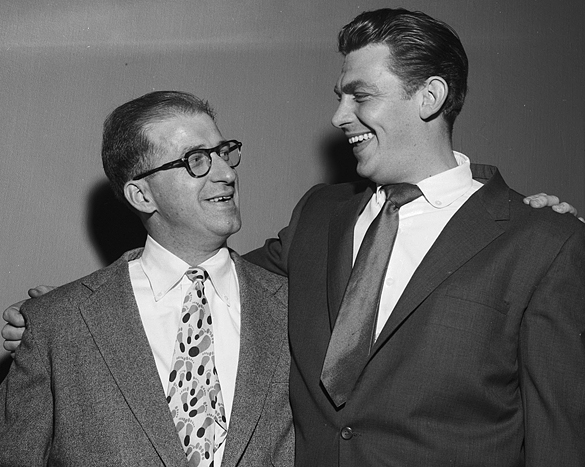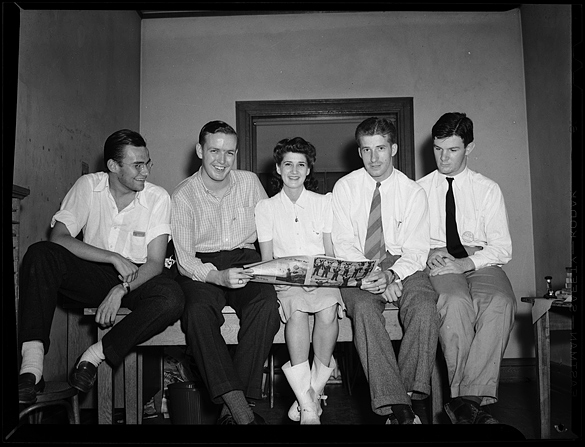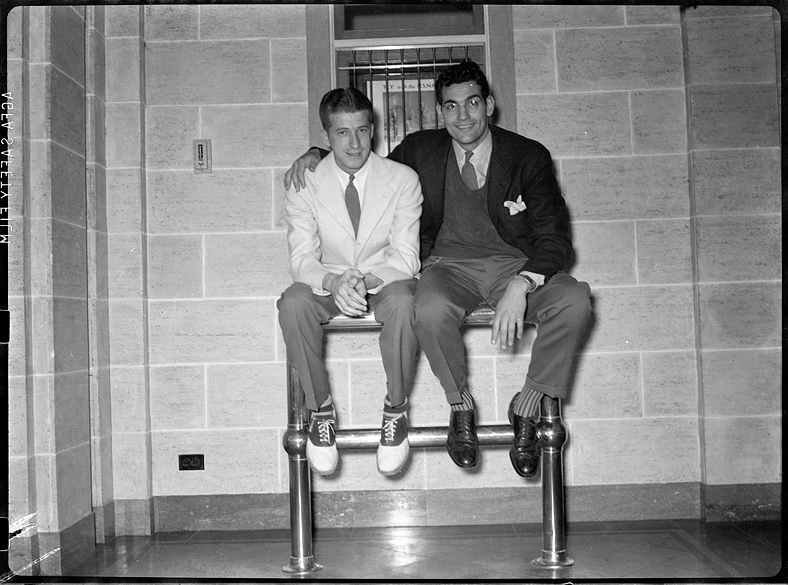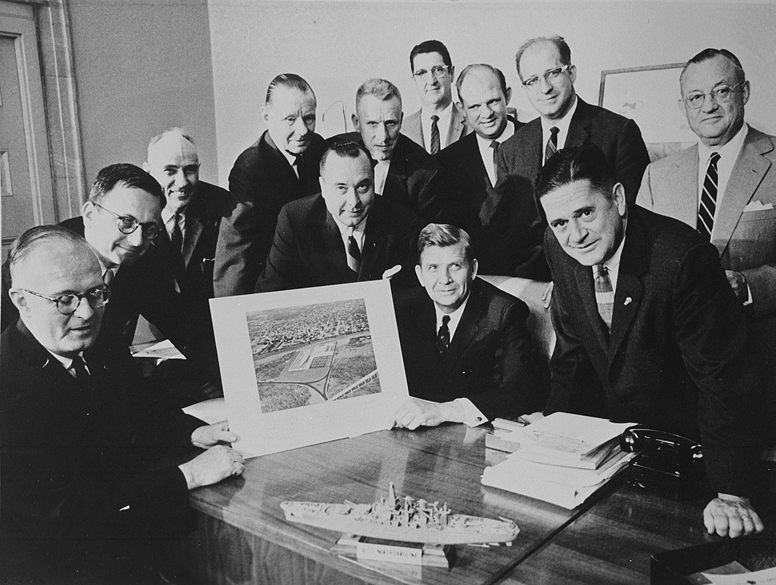Today’s post comes to us from Jack Hilliard, who has amassed many, many frequent contributor miles here at A View to Hugh.
The famous headline in the entertainment weekly Variety on October 30, 1929 (the day after black Tuesday) was: “Wall St. Lays An Egg.” For many in North Carolina there is another famous Variety headline which appeared a little over twenty years later and goes like this: “Country Hick Brings Back Talking Records.” The talking record featured Andy Griffith and was called “What It Was, Was Football.” The hick, however, was not Andy, but was UNC alum, Chapel Hill record producer, newspaper publisher, and civic leader Orville Bentley Campbell.

I first heard the name Orville Campbell in the fall of 1949 when he, along with Hank Beebe, wrote the song “All The Way Choo Choo,” honoring UNC football great Charlie Justice. Recorded on King Records by bandleader, and Duke University graduate, Johnny Long, the record sold about 32,000 copies across North Carolina. (It has often been reported that Benny Goodman also recorded “All The Way Choo Choo,” but there is no Goodman recording. There is, however, a Goodman arrangement of the song; he and his band performed it live in concert, but never made a formal recording.)

Justice and Campbell became great friends, and Justice—along with wife Sarah and son Ronnie—took one of Piedmont Airlines inaugural flights to Louisville, Kentucky to be best man in Orville’s wedding.
Campbell, in addition to his song writing, was a photographer, news reporter, editor, and book publisher. His journalism days go back to his student days at Carolina. He beat out Louis Harris, the famous pollster, for the editorship of The Daily Tar Heel in 1942. Campbell credits his success in that “Tar Heel” election to his manager, UNC basketball great George Glamack.

Following his UNC graduation, the Commander of the North Carolina Pre-Flight School at Chapel Hill, O.O. Kessing (USN), arranged for Campbell to serve as Associate Editor of the Pre-Flight weekly newspaper, Cloudbuster. Later he served in the South Pacific and returned to North Carolina following the war. Upon his return, he served in the news bureau at WCUNC in Greensboro (now UNCG) before returning to Chapel Hill.
Campbell was the founder and CEO of Colonial Publishing and Colonial Records—both based in Chapel Hill—and he produced music with John D. Loudermilk, with baseball legend Dizzy Dean, WPTF Announcer Phil Ellis, Hoke Simpson, Billy “Crash” Craddock, and a Chapel Hill group called The Belltones. One of his most successful recordings was that Andy Griffith monologue that Variety was excited about in the early 1950s, which Colonial Records recorded first and then released to Capitol Records. Andy also performed it on Ed Sullivan’s Toast of the Town on CBS-TV in January of 1954.
Campbell, along with Beebe, also wrote “Way Up in North Carolina.” That song was performed by The Belltones, released on Colonial Records, performed by Fred Waring on his CBS-TV show, and profiled by the North Carolina magazine The State in the September 15, 1951 issue.
On January 31, 1988, the Winston-Salem Journal profiled Orville Campbell in a feature written by Tom Seig. (The name Tom Seig will be familiar to Hugh Morton fans for his work on the 1995 Morton PBS documentary The Search For Clean Air.) Seig relates a famous John D. Loudermilk – George Hamilton IV – Orville Campbell connection. According to Seig, George Hamilton IV came to Chapel Hill about two years after Andy and his football tale. Hamilton wanted to be a star at the Grand Ole Opry so he sent Campbell an audition tape. Campbell’s advice was for Hamilton to pursue his dream by writing his own songs. So he wrote several songs, but had little success. Then one day he met Campbell’s friend John D. Loudermilk, who had written a sentimental number about a boy who could give his girlfriend only a single flower and a candy bar. Said Seig, “Hamilton hated the song, and Loudermilk hated the way Hamilton sang it, but Campbell loved them both.” So “A Rose and a Baby Ruth” was recorded and the rest is history. A side note: soon after the song was released, Campbell received a letter from the candy company saying he had violated their copyright. Before he could get his legal team in place, a second letter came saying forget the first letter. Candy bar sales were increasing at a rapid rate.
Orville Campbell’s list of close friends reads like a who’s who in Chapel Hill and the University: William Friday, W.D Carmichael, Terry Sanford, Luther Hodges, Hugh Morton, William Aycock, and Charlie Justice. The list goes on . . . baseball greats Ted Williams, Clyde King, and George Steinbrenner, football greats Jim Tatum, and Otto Graham as well as legendary golfer Sammy Snead.
Campbell, a dedicated democrat, Presbyterian, and teetotaler put his stamp on Chapel Hill and was named Citizen of the Year four times by the Chapel Hill Chamber of Commerce.

On November 11th, 1960, North Carolina Governor Luther H. Hodges appointed the USS North Carolina Battleship Advisory Committee to investigate the feasibility of establishing the warship as a state memorial. Members of that committee included Hugh Morton and Ed Rankin among others and heading the committee was Orville Campbell. After several trips to Bayonne, New Jersey to view the ship in mothballs, Campbell reported to the Governor that it would indeed be feasible and advisable to save the ship. The remainder of that story is now a part of North Carolina history.
Campbell was famous for his sense of humor and was a roaster at a Charlie Justice Juvenile Diabetes roast on April 30, 1984 in Charlotte and related this story about his dear friends W.D Carmichael and Charlie Justice:
We always liked to take our songs over to Mr. W.D. Carmichael, then acting University President, and get his opinion. So when we finished “All The Way Choo Choo,” I went over to Carmichael’s office. He was extremely busy that day, but I went in anyway. His desk was covered with papers and he didn’t even look up.
“What do you want, Orville?” said Carmichael.
“I just wanted to know if you had heard our last song.”
“I hope the h— I have,” was the reply.
On Monday, June 5, 1989, Campbell was admitted to North Carolina Memorial Hospital for observation after experiencing shortness of breath. The following day came the sad news from Dr. James R. Harper that Orville Campbell had died of heart failure at approximately 6 a.m. on Tuesday, June 6, 1989. He was 69 years old.
On June 9th, a capacity crowd, led by Minister R. David Hoffelt, at University Presbyterian Church in Chapel Hill, celebrated his life.
Orville Campbell, like his dear friend Hugh Morton, was a North Carolina treasure.

Anyone know where I can get a Tar Heel tie like that these days?
An interesting post…complete with a Morton photograph.
http://www.bsnpubs.com/london/colonial/colonial.html
There is a brief take on Colonial Records in the current (September) issue of “Our State” magazine on page 10.
Orville was hands down a great guy. He was my step- father grom age 16 on. Words can not express how much I loved this guy. He treated my mom wonderfully. And he and I had some wonderful times together (playing golf and just taking).
A little story … When I was in school at Carolina I thought my tennis game was getting pretty good. Orville mentioned he played some tennis and suggested we play some. I thought I would need to take it easy on the guy. (At this age he had a bit of a paunch.) Well I couldn’t touch him. He had an unbelievable serve … good speed but it was the spin that made it unreturnable. Turns out he had been a top ranked player back in high school.
Hi! I am enjoying reading about Orville Campbell and his family. We just moved into 1002 Kings Mill Rd. and people keep calling it the Orville Campbell House. Great stories and history here. Thanks for sharing.
It was the summer of 1964 in Chapel Hill, and I had three months to get into mischief before returning to school. I was 14 years old, and needed a summer job in the worst way. My Dad was friends with Orville Campbell, and arranged for me to meet him.
Being only 14, I was not legally old enough to work on someone’s payroll. But Mr. Campbell found a way around this. I worked at the Colonial Press for an entire summer, and instead of giving me a weekly paycheck, he issued a check to my Dad as a “consulting fee” and my dad endorsed the check over to me.
Although it was “off the books” so to speak, Mr. Campbell got some cheap coolie labor, and I got some valuable work experience. I am eternally grateful to Mr. Campbell for giving me this opportunity!
I worked for Mr. Campbell at Creative Printers/Colonial Press while attending Journalism School at UNC and afterwards in the 1980s. He was a kind and generous employer and his sense of humor brightened the whole place. He was a character, for sure. Because I was attending UNC while working full time, he gave me a lot of freedom with my hours.
Once a customer’s job file folder went missing in the middle of the job and when I came into work, everybody was frantic looking for it. I started going through the wall of file cabinets of finished job files and found the folder, misfiled. He was delighted. I’ll never forget him telling me, “You are Damn good help when you are around!”
It was a sad day when he died.